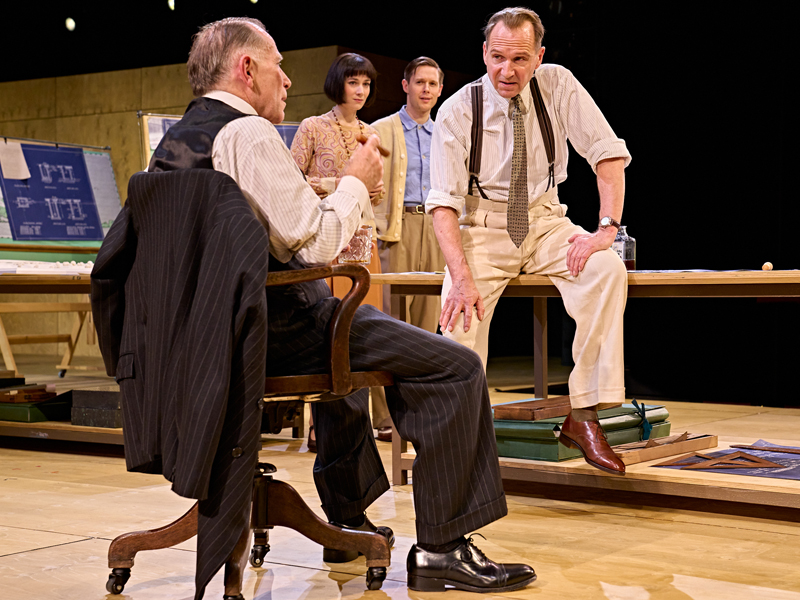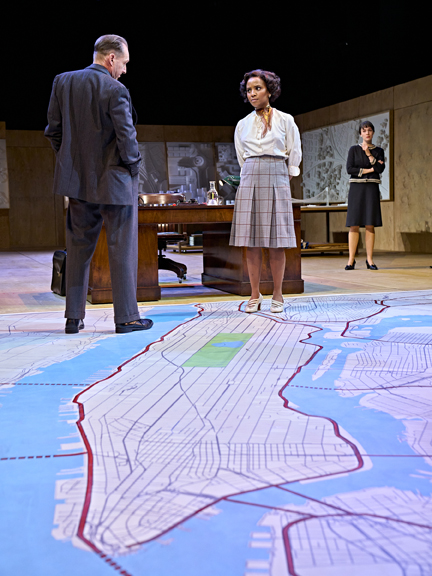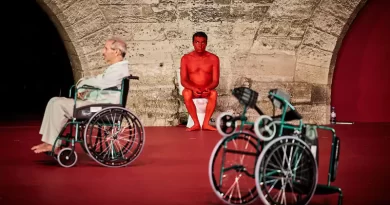“Straight Line Crazy”: Bridge Theatre
Neil Dowden on the South Bank
30 March 2022
David Hare’s new play Straight Line Crazy at the Bridge Theatre reunites him with director Nicholas Hytner and actor Ralph Fiennes, the team behind the autobiographical Covid monologue Beat the Devil at the same venue, which led London theatre out of lockdown in 2020.

Danny Webb, Siobhán Cullen, Samuel Barnett and Ralph Fiennes.
Photo credit: Manuel Harlan.
This time the subject is a meaty one: a portrait of Robert Moses, the powerful and controversial unelected public official who supervised the urban planning of New York for five decades of the mid-twentieth century. The title comes from Moses’s habit of laying down a pencil on the map of the city where he wanted to change the landscape and building in that straight line regardless of what lay in the way. Like its protagonist, the play is fascinating but flawed.
No single figure had more influence over the reshaping of New York’s environment over such a long period than Moses. The son of a Jewish millionaire department-store owner, he studied at Yale, Oxford, and Columbia, before making an impact in public service under the patronage of New York Governor Al Smith. Moses was a visionary planner who ostensibly wanted to improve the daily transportation and leisure opportunities of millions of ordinary New Yorkers, but from a patrician perspective: he claimed he acted on behalf of the masses, but did so without much consultation with them. As Hare’s Moses says: “The people lack imagination; it’s the job of the leaders to provide it.”

Ralph Fiennes, Alisha Bailey and Siobhán Cullen.
Photo credit: Manuel Harlan.
Hare shows how although Moses was unafraid to incur the wrath of the rich who objected to his plans, he also ran roughshod over the complaints of the less privileged. His output was prodigious. He presided over the creation of a network of parks, playgrounds, swimming pools and other recreational facilities, reclaimed waterfront amenities, public buildings like the United Nations headquarters and the Lincoln Center, bridges, tunnels, and expressways – but no railway or subway lines or stations. He always prioritized the motor car over public transport which, as well as not being green, favoured the better-off. Moreover, he destroyed some local communities with slum clearance and urban regeneration – displacing at least a quarter of a million people – particularly those inhabited by black and Latino populations, prompting charges of racism.
To give some dramatic focus to such a vast topic, Hare sets his play first in 1926 and then in 1955, two decisive moments in Moses’s career: respectively, the successful Long Island Jones Beach and the failed plan for a Lower Manhattan Expressway through Washington Square Park. We first see Moses, after a swim at Long Island, calling unannounced at the mansion of Henry Vanderbilt, no less. He tells him straight that he is going to go ahead and construct a public beach resort nearby in spite of the local grand families’ attempts to keep the place exclusive. Back in his office, Moses is similarly direct with his bullish boss Al Smith, who doesn’t want him to get above himself, but the relationship is much more cordial. Moses also retains the loyalty of his staff despite his high-handed, un-empathic manner as they support his ideals.

Samuel Barnett and Ralph Fiennes. Photo credit: Manuel Harlan.
By the second half of the play, Moses’s uncompromising, unaccountable approach has become out of step with modern sensibilities. The protest campaign to save the character of Greenwich Village from his plans to bisect it with a highway ultimately wins. His staff who have been through thick and thin with him have had enough. And there is a high personal cost to his workaholic lifestyle and emotional remoteness: we hear that his (offstage) wife has become an alcoholic and eventually ends up in a psychiatric hospital.
Hare has created a complex, ambivalent main character, at once progressive and reactionary, democratic and autocratic; a man not using his power for personal gain yet who is capable of dodgy legal and ethical actions. But the play depends too much on Moses’s presence, with other characters paling beside him. It also needs more dramatic energy, as a verbose work that too often tells rather than shows us what is going on. However, Straight Line Crazy is the most substantial work by Hare for a long time and it holds our interest throughout its two and a half hours on stage. It is helped by a slick, thrust-stage production from Hytner, with Bob Crowley’s flexible design featuring white models of buildings and charts of New York City on tables and drawing boards, with a map covering half of the stage at one point.

Helen Schlesinger in foreground. Photo credit: Manuel Harlan.
Ralph Fiennes gives a swaggering, not to say grandstanding, portrayal of Moses, channelling a bit of Ibsen’s Solness in The Master Builder (which he played in Hare’s adaptation at the Old Vic in 2016). It may seem a bit over-the-top at times but the character is written as larger than life. It’s a muscular performance, often with legs astride and hands on hips, though he convincingly ages between the two acts that are 30 years apart so that his assertive energy is reduced by the end.
Moses locks horns with Danny Webb’s flamboyant, cigar-smoking, whiskey-swilling Al Smith in an amusing alpha-male showdown which is probably the highlight of the show. Despite their character limitations that involve listening in awe to Moses’s speechifying, there are also strong supporting performances as his long-suffering assistants from a feisty Siobhán Cullen who becomes the only person that Moses will take criticism or advice from and Samuel Barnett who adopts a drily witty pragmatic attitude. Alisha Bailey also does well in the second half as a new appointee who represents a younger generation, standing up to Moses and telling him he is out of touch with public opinion. But Helen Schlesinger’s role as the activist and Moses critic Jane Jacobs – a narrator-like figure speaking directly to the audience – seems rather redundant in a weighty play not short on exposition.
On 26 May National Theatre Live will broadcast Straight Line Crazy from the Bridge Theatre to cinemas across the UK.









